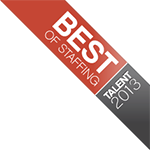How to Respond to Common Interview Questions
|
 |
 I often get letters from readers who are having difficulty getting the job they want. Many haven't job hunted in a long time and they are having trouble with the interview process. Here are some commonly asked interview questions and suggested ways to respond.
I often get letters from readers who are having difficulty getting the job they want. Many haven't job hunted in a long time and they are having trouble with the interview process. Here are some commonly asked interview questions and suggested ways to respond.
Tell me about yourself
If you haven't done any preparation for this interview, you may already be in trouble. This question is so open-ended, you may inadvertently head in the wrong direction or go on too long. This is often an opening question, so you can stay somewhat general, but keep in mind they will be evaluating what you say against the job qualifications. For instance, if the job is for an accountant with an accounting services firm, a good response would be, "I'm an outgoing person and I have a lot of community interests. I really enjoy my profession and feel a sense of satisfaction when I can get to know my clients on a more personal level. I think it builds trust, which helps me to understand their business problems and offer innovative solutions." (The response conveys a customer service focus, a willingness to network, and a problem-solving attitude: just the things required in this position.)
Why did you leave your last position?
This answer should be squeaky clean. Even if you hated your last job, you need to find a positive spin. Let's face it, any criticism will only make them want to dig to see if you were the problem. For instance, if you left because your manager was a glory-grabbing egomaniac, rephrase it more positively, "I'm looking for a position that will allow me to contribute more and learn new things." (After all, isn't that what your former boss wouldn't let you do?)
If you lost your job due to a downsizing, it will help if you weren't the only one who was let go. It's also critical to be upbeat and not bitter. For instance, "The company was acquired and they were forced to eliminate all the duplicate positions. I'm looking at this as a fresh opportunity to grow my career."
Why are you interested in this position?
This is where you'd better know your stuff. In fact, it's similar to the question, "What are your strengths?" because both are asking you to sell yourself. The interviewer is listening to your answer to see if you match the qualifications for the job. Prior to the interview, you should have developed short mini-stories that illustrate past examples about your results in each qualification. For instance, "The qualifications seem like a very good match to my past experience and interests. For example ..."
The worst answer you can give is a selfish one, such as, "I like the pay" or "I only can work part time, so the hours are right for my schedule." Those things may be true, but you should be more focused on what you can contribute and how well you'll fit the job.
What did you dislike about your past jobs?
This one is tricky because you can't wiggle out of it. If you say, "Gee, I liked everything about my old job," you'll sound phony and they'll probably ask you why you left. It pays to have given this thought beforehand. If you blurt out something that is a key part of the new position, you've just shot yourself in the foot ("The customers were too demanding"). Besides, something you didn't like in your old job can be much different in a new job.
For a sales position, a reasonable answer could be, "Some customers were very difficult to deal with. In spite of everything I would do to help them, there were things beyond my control, so they were still unhappy and that was frustrating." (The answer conveys that you did everything you could to help and that you want to satisfy customers.)
Where do you want to be in five years?
Don't make the mistake of thinking that a far-reaching goal will demonstrate your ambition. This can backfire. For instance, "I want to be a vice president in five years" may: a.) Make you sound na´ve, b.) Make you sound so ambitious you won't stay long, or c.) Threaten the person who is interviewing you (Even if he or she isn't the VP, you will be viewed as a potential competitor).
Another example would be a person who is interviewing for a sales position but says, "I'd like to be a sales manager in five years." The interviewer may think the person doesn't like to sell, is over qualified, or doesn't have the right skill set.
The best bet is to focus on the current position and say something such as, "I realize that my career could go in many different ways. I enjoy the field I'm in and as long as I'm learning new things and expanding my responsibilities, I'll be happy."
| About the Author Joan Lloyd is a Milwaukee based executive coach and organizational & leadership development strategist. She is known for her ability to help leaders and their teams achieve measurable, lasting improvements. Joan Lloyd & Associates, specializes in leadership development, organizational change and teambuilding, providing: executive coaching, CEO coaching & team coaching, 360-degree feedback processes, customized training (leadership skills, presentation skills, internal consulting skills & facilitation skills), team conflict resolution and retreat facilitation. Contact Joan Lloyd & Associates at (800) 348-1944, mailto:info@joanlloyd.com, or www.JoanLloyd.com |





